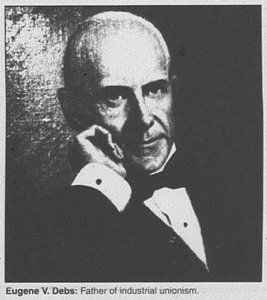
November 5, 1855 - Eugene V. Debs
By Dipa Sarkar
Much has been said and written about Eugene V. Debs, an extraordinarily gifted man who was in so many ways so far ahead of his time. He was without a doubt the father of the industrial unionism in this country, although the concept was not firmly established until after his death.
As a labor organizer, his talents bordered on genius. He helped build the railway unions into a powerful economic force. He was a writer, lecturer, passionate advocate of the under-privileged- the hero of millions of working people throughout the world.
His Vision of the Society- a society in which there is brotherhood of races working together in peace and prosperity- has not been realized. But he insisted that we keep the dream before us. He knew the eternal truth voiced by a prophet: “Where there is no vision, the people perish.”
Terre Haute has been blessed with this illustrious son-Eugene Victor Debs, who was born in 1855 in this frontier town of 6,000. His father, Jean Daniel, and mother Marguerite Daisy, immigrated to the United States from the Alsace region of France. His bookish father named his son after famous authors Victor Hugo and Eugene Sue.
His parents ran a small grocery store from the front room of their house which brought them a modest income. There were four sisters and two brothers, and they all learned to speak French and German from their parents.
In 1879, when Eugene was 14, he left school as it bored him and, being the first son, he had to earn money to help the family.
He always loved railways. He found a painting job and then a night fireman’s job in a 70 mile stretch from Terre Haute to Indianapolis. It is here he learned all of the hardships and dangers of the railway men.
Late in 1874 he gave up but never lost fascination for railroad life. He became a billing clerk in Terre Haute. He went through many different positions such as secretary of the Masonic Lodge, Vigo Lodge No. 16- a benevolent organization concerned with group insurance plans, railroad workers pay, safety measure and hours of work. He was editor of the lodge newspaper, The Magazine. He was also elected city clerk.
In 1885 he married Kate Metzel, daughter of a prominent druggist. They did not have children. Their relationship was described as cordial, but she did not approve of his activities.
There was a strong presence of another lady- his neighbor, Mabel Curry- whom he described as “Juno the divine.” She was very loving. She visited him in jail when his wife, Kate, did not.
In 1890, Eugene and Kate moved to their lovely home at 451 N. Eighth St., which now is a national historical landmark and headquarters for the Debs Foundation.
He helped found a social democratic party and ran as their nominee for president of the United States in 1900, 1904, 1908, and 1912, and also in 1920 by acclaim while in prison.
He was a pacifist and when war broke out in 1914, he protested violently.
In June 1918 in Canton, Ohio, Debs was charged with violating an espionage act and spent time in an Atlanta prison. After his release, he lived with Kate about six months, but his health was broken.
He died Oct. 20, 1926, in Lindlahr Sanatorium just outside Chicago; Highland Cemetery of Terre haute bears a simple marker where his ashes were interred.
Debs is remembered as the brightest star of American Socialism. He fought for ideals such as voting rights for everybody, civil rights for women, national health insurance, bargaining collectively and the right to strike.
Terre Haute is certainly blessed with this illustrious son who lighted our paths more than a hundred years ago. A visit to his home with all the memorabilia, documents and pictures bearing his rich legacy will be a worthwhile experience.
